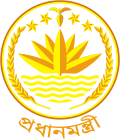| Prime Minister of The People's Republic of Bangladesh | |
|---|---|
| গণপ্রজাতন্ত্রী বাংলাদেশের প্রধানমন্ত্রী | |
 Seal of the prime minister of Bangladesh | |
 Standard of the prime minister of Bangladesh | |
since 5 August 2024 | |
| Style |
|
| Type | Head of Government |
| Status | Leader of the Executive |
| Member of | |
| Seat | Primary: Old Sangsad Bhaban (Prime Minister's Office), Tejgaon, Dhaka Secondary: Bangladesh Secretariat, Segunbagicha, Dhaka |
| Appointer | President of Bangladesh by convention, based on appointee's ability to command the confidence of the Jatiya Sangsad |
| Term length | At the pleasure of the President Jatiya Sangsad term is 5 years unless dissolved sooner No term limits |
| Constituting instrument | Constitution of Bangladesh |
| Inaugural holder | Tajuddin Ahmed |
| Formation | 17 April 1971 |
| Deputy | Deputy Prime Minister of Bangladesh |
| Salary | ৳215000 (US$1,800) per month ৳2580000 (US$22,000) per year (incl. allowances) [1] |
| Website | pmo |
| This article is part of a series on the |
| Politics of Bangladesh |
|---|
 |
|
|
|
|
The Prime Minister of Bangladesh (Bengali: বাংলাদেশের প্রধানমন্ত্রী, romanised: Bānlādēśēra pradhānamantrī), officially Prime minister of the People's Republic of Bangladesh (Bengali: গণপ্রজাতন্ত্রী বাংলাদেশের প্রধানমন্ত্রী, romanised: Gaṇaprajātantrī bānlādēśēra pradhānamantrī), is the chief executive of the government of Bangladesh. The prime minister and the cabinet are collectively accountable for their policies and actions to the Parliament, to their political party and ultimately to the electorate. The prime minister is ceremonially appointed by the president of Bangladesh.
The position was taken over by the military during the years of 1975–78, 1982–86 and 1990–91 due to imposed martial law. In each of these periods, the national government leadership was controlled by the military with the executive authority of the president and the prime minister. During the period between 1996 and 2008, the chief adviser of the caretaker government exercised authority as per the constitution as chief executive for 90 days during the transition from one elected government to another. The chief adviser headed an Advisory Committee comprising ten Advisers. With powers roughly equivalent to an elected prime minister, his executive power was constrained by certain constitutional limitations. The system was scrapped in 2011 by the 15th amendment of the constitution to allow any political government to conduct a General Election in the future.
Sheikh Hasina was the longest-serving prime minister in the country's history until her forced resignation on 5 August 2024, which left the position empty.
- ^ "Bangladesh raises president, prime minister's pay, perks". bdnews24.com. Archived from the original on 21 September 2019. Retrieved 28 October 2019.


